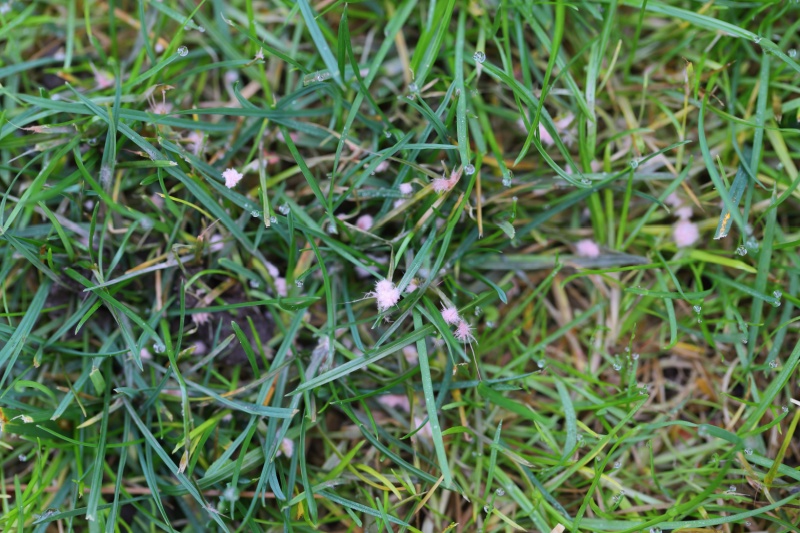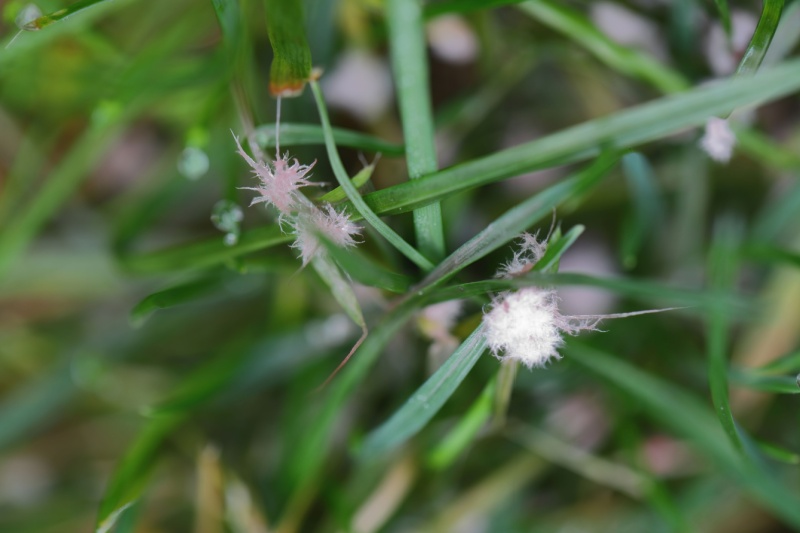
The Grounds Guys provide insights on managing Red Thread Lawn Disease.
|
You wake up in the morning, sip your coffee, glance outside, and…what the heck? Somehow, pink-orange webs seem to be strangling patches of your lawn. It sounds like you have a case of red thread lawn disease.
Red thread lawn disease is a pretty measly fungal infection that doesn’t actually do much damage to your grass. That said, most homeowners prefer the visual of a lush green lawn, not one tangled in unsightly, pinkish fungus.
Table of Contents:
What Causes Red Thread In Lawns?
The annoying villain behind your lawn’s red thread makeover is a fungus called Laetisaria fuciformis. Its spores can hitch a ride on the wind, lawn equipment, water, and even shoes. When conditions are poor, it likes to hide out in plant debris, soil, and thatch. As soon as conditions turn in its favor, it activates and begins producing its red, thread-like mycelium that covers your grass.
A few important factors can trigger red thread to start spinning its mycelium.
Cool, Humid Climate
Red thread lawn fungus absolutely loves a cool, humid climate. You’re most likely to see it in the spring or fall. Keep an eye out for this disease if you live in the Pacific Northwest, along the coast, or in New England. (Though red thread can appear almost anywhere in the United States).
Shade and Poor Circulation
If you’re at all familiar with fungus, then you know that it loves to creep around in dark, shady places that don’t get a lot of fresh air. If you have a lot of shade on your lawn or areas that don’t dry out regularly, you’re practically inviting red thread lawn disease over for tea.
Poor Lawn Care
Many lawn diseases, including red thread lawn fungus, can more easily gain a foothold when grass is weak and sparse. Lawns that are stressed from drought, over-fertilization, or other diseases can also be prime targets for this fungus.
Red Thread Lawn Fungus: Symptoms and Identification
As its name implies, the calling card of red thread lawn disease is the pinkish-red threads that appear like a net over the tips of infected grass blades. You’ll be able to see these threads clearly. Other less subtle symptoms of a red thread diseased lawn include:
- Irregular or circular patches in the lawn
- Reddish-brown grass color
- Stunted grass growth
- Thinning grass in more severe cases

How To Cure Red Thread In Lawns
If you want to get rid of the fungal infection ASAP, your best bet is to head down to your local gardening or home improvement store and pick up a fungicide that contains azoxystrobin, penthiopyrad, polyoxin D, and propiconazole as active ingredients.
One thing to note is that fungicides usually work best as a prevention tool, but you can use them to help stamp out a disease that has already started.
If you prefer a longer-term solution, work to eliminate the conditions that help red thread thrive. Begin by dethatching your lawn. Lower your watering schedule to just once or twice a week. (Think less frequent deep watering instead of more frequent shallow watering.) If possible, trim back trees or foliage to eliminate areas of shade on your lawn. You can also perform a soil test and add fertilizer to your lawn if needed. These actions will make it harder for red thread lawn disease to continue thriving on your lawn.
If your lawn has a severe case of red thread, you may want to call a professional landscaping team. Landscapers often have access to tools and products that aren’t available to the general public.
Prevention and Long-Term Care
Once you get your red thread disease lawn under control, make sure that fungus doesn’t return during the next spring or fall season. The best way to prevent most lawn diseases, including red thread, is to properly maintain your lawn. Healthy, thick grass often can outcompete lawn diseases.
Good lawn care includes regular mowing, deep watering, fertilization, aeration, and dethatching. As we mentioned above, you can also apply fungicides preventatively, especially if you notice a lot of red thread in the area.
One last thing to look at is your drainage. If your property holds onto a lot of water and your soil is often soggy, that could help red thread survive. Consider adding an irrigation system to your property. A professional landscaping team can often provide this service.
Get a Free Estimate Today and Protect Your Lawn From Red Thread Disease!
Even though red thread lawn disease doesn’t do much harm to your lawn, it can still diminish the overall curb appeal of your home. The best way to keep your lawn free of red thread is to perform ongoing lawn maintenance. However, not everyone has the time or ability to keep up with their lawn chores.
That’s where we come in. The Grounds Guys® has knowledgeable and responsive service professionals across the United States that can help you with red thread or any other lawn diseases. We can immediately tackle the red thread lawn fungus and then provide ongoing lawn care to keep your property healthy and strong. We are reliable, experienced, and focused on offering great customer service. That’s all part of our Neighborly Done Right Promise®.
Ready to get rid of your red thread lawn disease? Get a free estimate today.
Disclaimer: This article is intended for general guidance only and may not be applicable to every situation. You are responsible for determining the proper course of action for your property and your situation. Grounds Guys is not responsible for any damages that occur as a result of any advice or guidance derived from blog content. For the most accurate guidance, contact an independently owned and operated Ground Guys for more information and a professional on-site assessment.